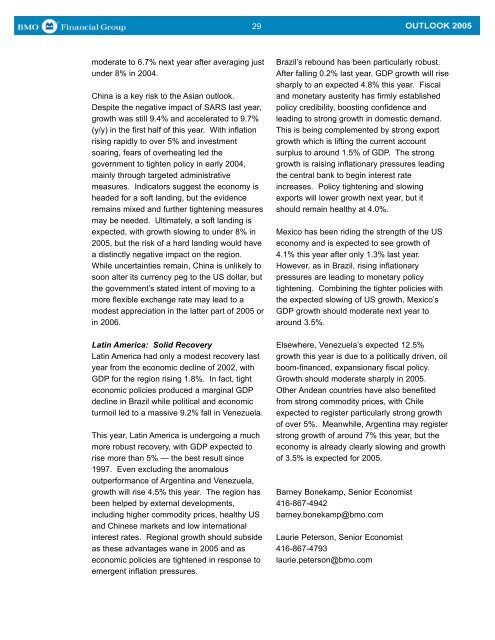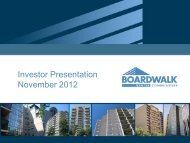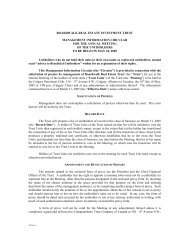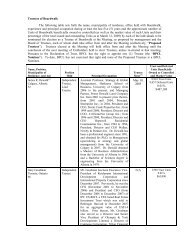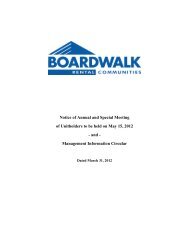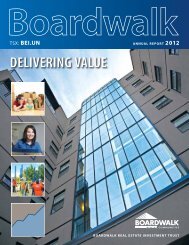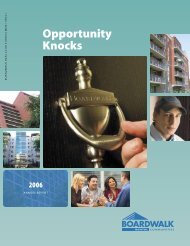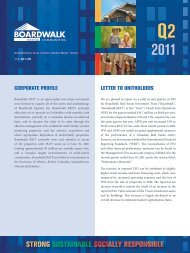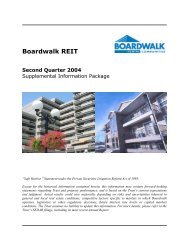BMO Financial Group - Outlook 2005(1.1Mb pdf File) - Boardwalk REIT
BMO Financial Group - Outlook 2005(1.1Mb pdf File) - Boardwalk REIT
BMO Financial Group - Outlook 2005(1.1Mb pdf File) - Boardwalk REIT
Create successful ePaper yourself
Turn your PDF publications into a flip-book with our unique Google optimized e-Paper software.
29<br />
moderate to 6.7% next year after averaging just<br />
under 8% in 2004.<br />
China is a key risk to the Asian outlook.<br />
Despite the negative impact of SARS last year,<br />
growth was still 9.4% and accelerated to 9.7%<br />
(y/y) in the first half of this year. With inflation<br />
rising rapidly to over 5% and investment<br />
soaring, fears of overheating led the<br />
government to tighten policy in early 2004,<br />
mainly through targeted administrative<br />
measures. Indicators suggest the economy is<br />
headed for a soft landing, but the evidence<br />
remains mixed and further tightening measures<br />
may be needed. Ultimately, a soft landing is<br />
expected, with growth slowing to under 8% in<br />
<strong>2005</strong>, but the risk of a hard landing would have<br />
a distinctly negative impact on the region.<br />
While uncertainties remain, China is unlikely to<br />
soon alter its currency peg to the US dollar, but<br />
the government’s stated intent of moving to a<br />
more flexible exchange rate may lead to a<br />
modest appreciation in the latter part of <strong>2005</strong> or<br />
in 2006.<br />
Latin America: Solid Recovery<br />
Latin America had only a modest recovery last<br />
year from the economic decline of 2002, with<br />
GDP for the region rising 1.8%. In fact, tight<br />
economic policies produced a marginal GDP<br />
decline in Brazil while political and economic<br />
turmoil led to a massive 9.2% fall in Venezuela.<br />
This year, Latin America is undergoing a much<br />
more robust recovery, with GDP expected to<br />
rise more than 5% — the best result since<br />
1997. Even excluding the anomalous<br />
outperformance of Argentina and Venezuela,<br />
growth will rise 4.5% this year. The region has<br />
been helped by external developments,<br />
including higher commodity prices, healthy US<br />
and Chinese markets and low international<br />
interest rates. Regional growth should subside<br />
as these advantages wane in <strong>2005</strong> and as<br />
economic policies are tightened in response to<br />
emergent inflation pressures.<br />
Brazil’s rebound has been particularly robust.<br />
After falling 0.2% last year, GDP growth will rise<br />
sharply to an expected 4.8% this year. Fiscal<br />
and monetary austerity has firmly established<br />
policy credibility, boosting confidence and<br />
leading to strong growth in domestic demand.<br />
This is being complemented by strong export<br />
growth which is lifting the current account<br />
surplus to around 1.5% of GDP. The strong<br />
growth is raising inflationary pressures leading<br />
the central bank to begin interest rate<br />
increases. Policy tightening and slowing<br />
exports will lower growth next year, but it<br />
should remain healthy at 4.0%.<br />
Mexico has been riding the strength of the US<br />
economy and is expected to see growth of<br />
4.1% this year after only 1.3% last year.<br />
However, as in Brazil, rising inflationary<br />
pressures are leading to monetary policy<br />
tightening. Combining the tighter policies with<br />
the expected slowing of US growth, Mexico’s<br />
GDP growth should moderate next year to<br />
around 3.5%.<br />
Elsewhere, Venezuela’s expected 12.5%<br />
growth this year is due to a politically driven, oil<br />
boom-financed, expansionary fiscal policy.<br />
Growth should moderate sharply in <strong>2005</strong>.<br />
Other Andean countries have also benefited<br />
from strong commodity prices, with Chile<br />
expected to register particularly strong growth<br />
of over 5%. Meanwhile, Argentina may register<br />
strong growth of around 7% this year, but the<br />
economy is already clearly slowing and growth<br />
of 3.5% is expected for <strong>2005</strong>.<br />
Barney Bonekamp, Senior Economist<br />
416-867-4942<br />
barney.bonekamp@bmo.com<br />
Laurie Peterson, Senior Economist<br />
416-867-4793<br />
laurie.peterson@bmo.com


